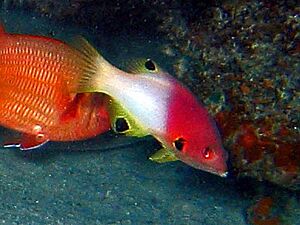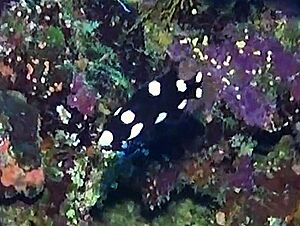Axilspot hogfish facts for kids
Quick facts for kids Bodianus axillaris |
|
|---|---|
 |
|
| Bodianus axillaris male in Polynesia | |
 |
|
| Female, in Red Sea | |
| Conservation status | |
| Scientific classification |
|
| Kingdom: | Animalia |
| Phylum: | Chordata |
| Class: | Actinopterygii |
| Order: | Labriformes |
| Family: | Labridae |
| Genus: | Bodianus |
| Species: |
B. axillaris
|
| Binomial name | |
| Bodianus axillaris (Bennett, 1832)
|
|
| Script error: The function "autoWithCaption" does not exist. | |
| Synonyms | |
|
|
Script error: No such module "Check for conflicting parameters".
The axilspot hogfish (Bodianus axillaris) is a colorful fish found in the ocean. It's also known as the coral pigfish or turncoat hogfish. This fish belongs to a group called wrasses. You can find it swimming in warm waters across the Indo-Pacific region.
Contents
What Does the Axilspot Hogfish Look Like?
This fish is quite special because males and females look different. This is called sexual dimorphism.
- Male axilspot hogfish are reddish-brown at the front. Their back half is white. They have a big black spot near their pectoral fin (the fins on their sides). They also have black spots on their dorsal fin (top fin) and anal fin (bottom fin).
- Female axilspot hogfish and young fish (juveniles) are blackish. They have white patches along their upper and lower sides.
- Young axilspot hogfish look a bit like another fish, the split-level hogfish (Bodianus mesothorax). But the axilspot juveniles have white spots instead of yellow ones.
This fish can grow up to about 20 centimeters (8 inches) long.
Where Do Axilspot Hogfish Live?
Axilspot hogfish live in the warm waters of the Indo-Pacific. You can find them from the Red Sea all the way to South Africa. They also live near the Marshall Islands, Marquesan Islands, and Tuamoto Islands. Their range extends north to Japan.
Axilspot Hogfish Habitat and Behavior
Adult axilspot hogfish like clear lagoons and coral reefs. They are common in shallow waters, usually between 1 and 8 meters (3 to 26 feet) deep. Sometimes, larger fish are found in deeper water, even below 27 meters (88 feet).
Young axilspot hogfish often live alone. They hide in caves or under rocky overhangs. When they are young, and sometimes even as adults, they act as cleaner fish. This means they help other, bigger fish by eating tiny parasites off their bodies.
Their diet mainly consists of small, hard-shelled animals that live on the seafloor. These include creatures like molluscs (like snails) and crustaceans (like crabs and shrimp).
Axilspot hogfish lay eggs. This is called being oviparous. When it's time to lay eggs, the males and females form special pairs.
Axilspot Hogfish and Humans
You don't often see axilspot hogfish in home aquariums. They are also not a main target for commercial fishing.
How the Axilspot Hogfish Got Its Name
The axilspot hogfish was first officially described in 1832. An English zoologist named Edward Turner Bennett gave it the scientific name Labrus axillaris. He found the first known example of this fish in Mauritius.
 | Emma Amos |
 | Edward Mitchell Bannister |
 | Larry D. Alexander |
 | Ernie Barnes |


